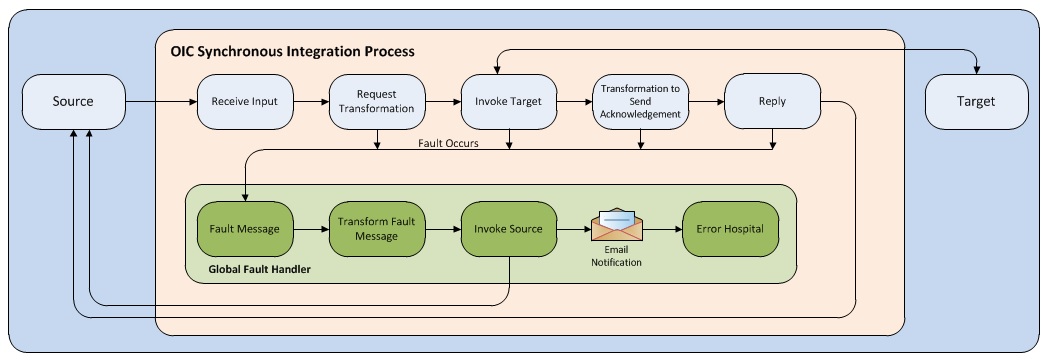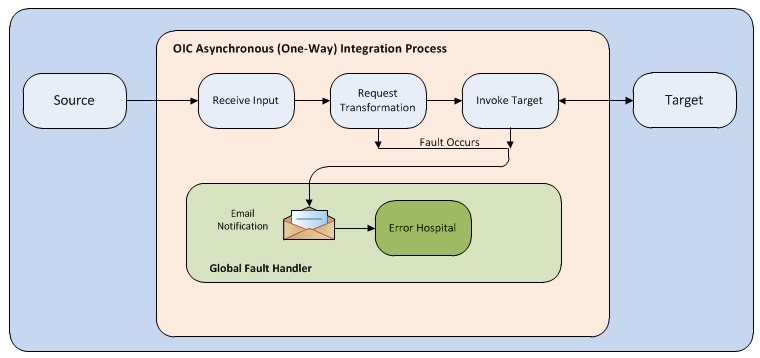Solution Overview
The technical aspects involved in the integration between Oracle Utilities Digital Asset Cloud Service and Oracle Utilities Grid Edge Distributed Energy Resources Management System are:
• The integration layer consists of integration processes deployed on Oracle Integration Cloud.
• The integration processes interact with other applications using the following adapters:
• Oracle Utilities Adapter interacts with the DACS REST APIs and NMS-DERMS REST APIs.
• REST Adapter interacts with Oracle Cloud Infrastructure Object Storage APIs and DERMS REST APIs with file attachments.
• FTP Adapter interacts with Oracle Utilities Digital Asset Cloud Service On Premise Server to list, get, and rename files in the server.
• Two types of email notifications can be configured in this integration, namely, business and technical error email notification. Email notifications are optional, but by default are enabled.
• Business email notifications:
This notification is used in file processing flows.
Configure the property name notification.email.process.complete.flag in the OUTL-BRT-DACS_DRMS_ConfigProps lookup to 'true' to receive email notification when the process is completed or partially processed. By default, this is set to 'true'.
Configure the property name notification.email.process.nofile.flag in the OUTL-BRT-DACS_DRMS_ConfigProps lookup to 'true' to receive email notification when no file is found in the source location. By default, this is set to 'true'.
The recipient(s) of these email notification are configured in the to.process.notification recipients of the OUTL-BRT-OUAI_DACS_DRMS_Email_ID lookup. These are sent to the business users of the applications.
• Technical error email notifications:
Configure the property name notification.email.error.flag in the OUTL-BRT-DACS_DRMS_ConfigProps lookup to 'true' to receive email notification when errors are encountered. By default, this is set to 'true'.
The recipient(s) of the email notification sent out for technical errors is configured in the to recipients of the OUTL-BRT-DACS_DRMS_Email_ID lookup. These are sent to the administrators of the applications.
• In the Oracle Utilities Digital Asset Cloud Service initiated processes, batch processes are used to send the outbound messages or to create file(s) and upload to the content server defined for an external application to pull for processing. Oracle Utilities Digital Asset Cloud Service uses REST inbound web services (IWS) to receive messages.
• In the Oracle Utilities Grid Edge Distributed Energy Resources Management System initiated processes, events are triggered to send the outbound messages and files if applicable. Oracle Utilities Grid Edge Distributed Energy Resources Management System uses REST APIs to receive the messages.
• To make sure all the integration flows work properly:
• Configure the properties in the OUTL-BRT-DACS_DRMS_ConfigProps lookup.
• Configure all DVM lookup related to this integration.
• For Scheduled Integration processes related to file transfer, make sure the dependent application extract processes are ran first so the files are already available in the content server for the integration process to pick up.
The integration patterns used in this solution are:
Synchronous
The synchronous integration process:
1. Receives request message from the source application.
2. Transforms the message from source format to the target format. Lookups are used for data translations, if applicable.
3. Invokes the target application.
4. Transforms the response message from the target format back to the source format. It sends back the response to the source application.
5. In case of any error, the global fault handler catches them and sends the transformed error message to the source application.
6. An optional email notification is sent to the respective users as configured. 

One-way Asynchronous
The one-way asynchronous integration process:
1. Receives request message from the source application.
2. Transforms message from the source to the target format. Lookups are used for data translations, if applicable.
3. Invokes target application to send the request message.
4. In case of any error, the global fault handler catches the error.
5. An optional email notification is sent to the respective users as configured.
6. The error instance can be re-submitted from Oracle Integration Cloud. Refer to the Error Handling section in Configuring Lookups, Error Handling, and Email Notifications for more details. 
